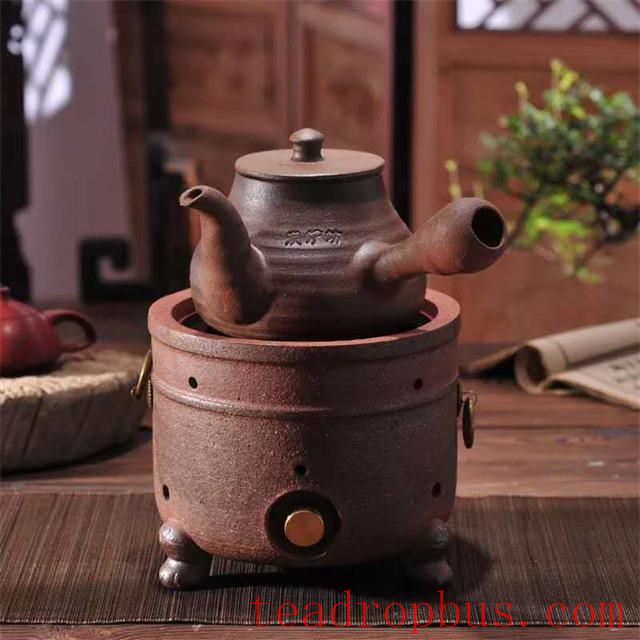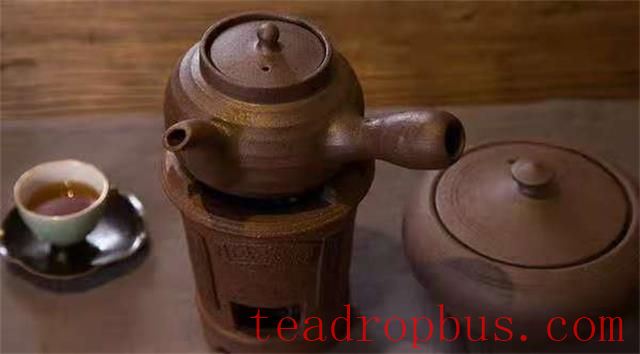Tea is winter's soulmate.
“Around the hearth it's brewed,” for those who love life, it's a wonderful thought.
In these four words, there's not only the red clay brazier, charcoal fire, people gathered around, and tea, but also an infinite sense of beauty.
To ordinary folks, it's a common affair in everyday life;
To literati and refined scholars, it adds elegance, embodying a unique spirit of appreciating things.

Tang Dynasty poet Bai Juyi wrote: “Newly brewed wine with green froth, a small red clay brazier. As evening falls and snow seems imminent, could we share a cup?”; he also wrote “bamboo cabinet filled with tea, a red clay stove for cooking.” These lines encompass both invitations to friends and refined scholars, as well as simple meals in daily life.
Du Xiaoshan wrote: “When guests come on a cold night, tea serves as wine, the bamboo stove's water boils, the fire just turns red. The same moonlight by the window as usual, yet with plum blossoms, everything feels different.” Serving guests, gathered around the hearth for conversation, brewing tea to warm the heart and mind, just as Huang Tingjian described it: “Like old friends returning from afar, unable to speak, yet inwardly happy and reflective.”
Song Dynasty poet Wang Zhi wrote: “The mud stove's pine fire smokes blue, water boiling in the clay pot. After waking up from a nap, the moon shines on the window, as if dreaming of Zhejiang Pavilion.” Lighting a fire, brewing a pot of tea, idly enjoying life.
Lu You wrote: “After a meal, unbuckling my belt and rubbing my belly, I fetch the wind stove to Brew late afternoon tea.” “By the clear windows, after waking up with nothing to do, I heat water over the fire stove.” “Fishing by the stream, treading on turbulent rapids, brewing tea under trees, setting up a wind stove.” For tea lovers, brewing tea over a wind stove aids digestion, it's a simple way of life; idly, by the stream or under trees, it's a refined freedom.
Whether it's the warm stove in an ordinary household or the wind stove of refined scholars, it's a way of life, also a “Dao.”
A stove represents a way of life, elegance, a world, transient existence, nature, and freedom.

Sen no Rikyu once said: “There is nothing else to the Way of Tea but to boil water, make tea, and drink it.” To brew exquisite tea, one cannot do without good water, a stove, and lively fire. Su Dongpo said: “Lively water must be boiled over lively fire.” Boiling water requires lively fire, which refers to charcoal fire with flame.
In “The Book of Tea,” Zhu Quan, the 17th son of Ming dynasty's Hongwu Emperor, wrote: “Charcoal that has flame is called lively fire. It should prevent the water from boiling aimlessly. Initially, bubbles like fish eyes spread out, then like springs bubbling with connected pearls, finally waves surge and froth, all signs of vapor dissipating. This three-boil method can only be achieved with lively fire.”
Preparing charcoal, igniting it, preparing water, gently fanning with a feather fan, neither too fast nor too slow, the so-called bright red stove, the tea kettle starts heating, the technique of fanning, whether light or vigorous, slow or quick, must be rhythmic. This is called “A gentleman watches the fire, with order and rhythm, skillful and natural, depending on the person.”
The charcoal: “Black Silver upon fire produces green mist, sinking into water, a thick column of smoke.” Entirely black, Chaozhou black olives, olive pits peeled and pitted, baked in a kiln to eliminate smoke, resembling coal dust; when used to boil water, the flame is lively, presenting a blue hue, evenly distributed, neither too fast nor too slow; such charcoal is the most precious and rare, a good companion for tea brewers.
The sand kettle, made of clay, due to its origin from earth, has a natural weightiness and stability, the water it boils is the most tender and light, with clear and lively quality.
Tea is nourished by water, water relies on vessels. In “Treatise on Tea,” Xu Chishu wrote about boiling water vessels: “Gold is the mother of water, tin combines softness and strength, its taste is not salty or astringent, making it best for kettles… Tea is nourished by water, water relies on vessels, tea is brewed by fire, these four elements are interdependent, lacking one would be futile.”
Waiting for the water to boil, listening to the sound of boiling water.
It seems you can hear raindrops falling from tree branches, the gentle breeze on the hillside, the chirping of birds in the forest, and various other indescribable sounds. One becomes part of these sounds, as if hearing the blooming of the soul, the noisy world recedes far away.

Song Dynasty's Luo Dajing wrote a poem about tea: “When the wind through the pines and cypresses first comes, hastily lift the copper bottle off the bamboo stove. After the sound and noise subside, a cup of spring snow surpasses the finest liquor.”
The first line describes the sound of boiling water like the wind through the pines and cypresses.
Another ancient poem vividly captures the sound of boiling water for tea: “Insects chirping, myriad cicadas urging, suddenly thousands of carts arrive. Hearing the pine wind and mountain stream, quickly fetch the pale green porcelain cup.”
In the Song Dynasty, a notable feature of tea appreciation was discerning water quality by sound.
Song Dynasty tea connoisseurs used narrow-necked bottles and kettles for boiling water, which made visual observation difficult, relying solely on auditory perception to distinguish the stage of boiling.
Therefore, Cai Xiang wrote in “Record of Tea”: “Waiting for the water to boil is the most challenging.”
Fire control involves both gentle and fierce fires. “If too gentle, the water becomes soft, and the flavor of tea diminishes; if too fierce, the fire becomes intense, and the tea is dominated by water, neither sufficient for harmony.”
Huang Tingjian described the sound of boiling water in “Essay on Brewing Tea” as “like the wind blowing through mountain pines.” In “Double Well Tea,” he wrote: “Not afraid of water misfortunes, fortunately not humiliated, listening to the wind through pines and cold spring water.”
Tang Dynasty poet Liu Yuxi described the sound of boiling water in “Song of Trying Tea at West Mountain Temple” as “sudden rain and the sound of pines enter the kettle.”
Pi Rixiu in “Boiling Tea” wrote “the sound resembles rain on pines.”
“Mountain Hall Night Sitting” states: “Drawing water to brew tea. When water and fire battle, it's like listening to pine winds. Pouring into cups, cloud-like ripples. At this moment, the subtle pleasure is hard to convey to the vulgar.”
“Unoccupied, occasionally sitting alone, the sound of boiling water for tea amidst falling flowers.”
Describing the sound of boiling water as pine wind, borrowing the sound of mountain pines to enhance the sound of boiling water, cold spring and hot tea, pine winds blowing, one cold and one hot, between extremes, the tea's aroma is crisp and refreshing.
Water and fire are both complementary and contradictory, and because of the integration of the stove and kettle, originally incompatible elements find a harmonious coexistence. Perhaps this is